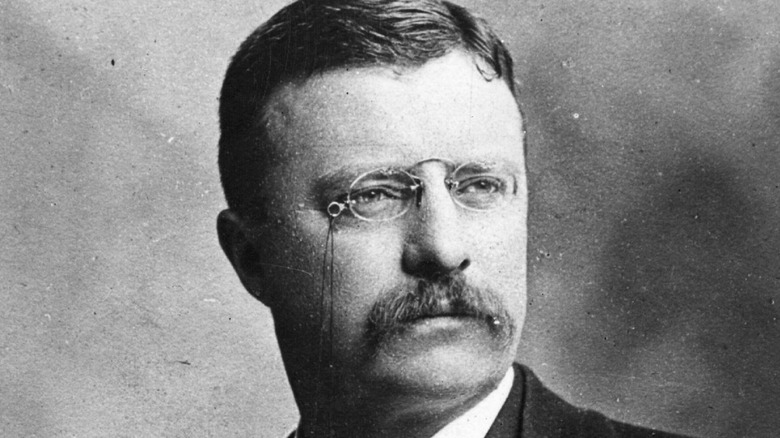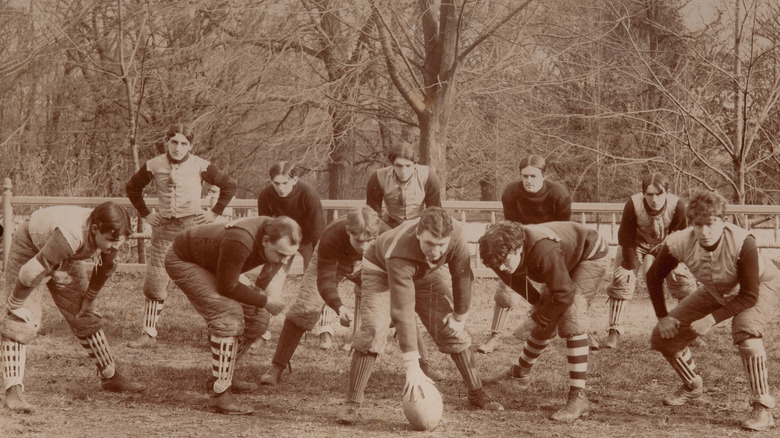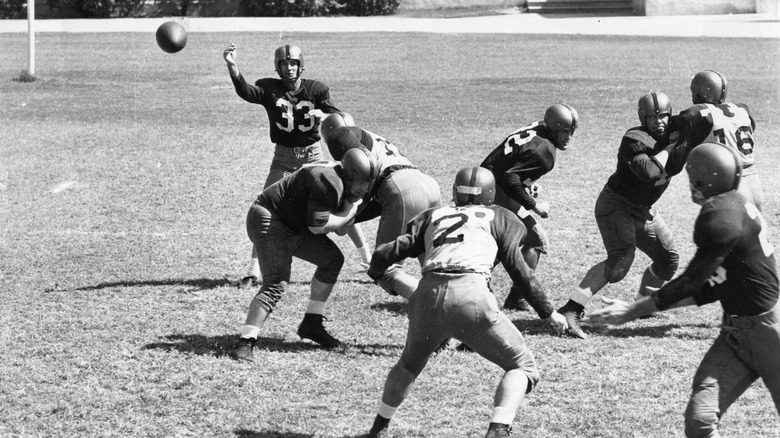Teddy Roosevelt Invented This Football Rule To Stop People From Dying
As much as it's fun to watch our favorite football teams take to the gridiron every game day, it's a totally different story, for the most part, for the big, beefy men scoring those touchdowns and preventing opposing players from doing the same. Recent research has done a lot to link the intense physical contact involved in the sport to concussions and other traumatic brain injuries, especially later in a player's life, once they've long retired from competitive football. But as bad as things may seem these days for football players at all levels, the sport was much more brutal back in its earliest days. And if it wasn't for some timely intervention from President Theodore Roosevelt (among many other reforms), football would have likely remained a low-scoring bloodsport only marginally safer than ancient gladiatorial combat.
To give you an idea of how dangerous American football was in the late 19th century and early 20th century, consider that players in that era typically did not wear helmets, nor did they don most of the protective equipment today's players are required to wear. Extremely violent plays like the "flying wedge" (via Four Walls Publishing) weren't just commonplace; they were celebrated on the sports pages and applauded by fans. But while many Americans were captivated by all that perceived machismo taking place on the football field, players were dying at an alarming rate at the time Roosevelt introduced an all-important football rule change — the forward pass.
Nearly 20 players died while playing football in 1905
According to The Washington Post, at least 45 football players were killed between 1900 and October 1905, most of them due to some form of unnecessary roughness. A good number of these deaths, as noted, were from concussions, broken necks, broken backs, and internal injuries.
By 1905, things were reaching critical mass, as there were at least 18 deaths and more than 150 injuries that took place on the gridiron that year alone. And the cries from football's detractors were growing louder, especially after the death of Union College halfback Harold Moore in November 1905. As explained by the Post, the young man was kicked in the head while trying to tackle a New York University player; he later died of a cerebral hemorrhage. Not long after, some of America's top universities temporarily suspended their football programs, with Harvard's then-president, Charles Eliot, quoted as saying that football is "more brutalizing than prizefighting, cockfighting or bullfighting."
Sizing up the matter, Teddy Roosevelt stressed that he "[believes] in outdoor games" and that he didn't mind that "they are rough games, or that those who take part in them are occasionally injured." However, the president was deeply concerned by the rising number of deaths in competitive football, and in December 1905, he met with officials from several schools to come up with rule changes that would potentially do away with the sport's more "brutal features."
The once-illegal forward pass helped save lives
The forward pass is a ubiquitous part of football as we know it. From Sammy Baugh (pictured) to Tom Brady, every modern-era quarterback throws, or has thrown forward passes to their receivers, and it's been that way for decades. But in the early days, it was illegal to throw a forward pass; instead, you had to throw laterals to your halfback or charge straight ahead against a phalanx of bloodthirsty defensive players. That was simply the more manly thing to do — just like playing both offense and defense in the same game, not wearing helmets, and other now-archaic practices that thankfully haven't existed for a while.
Thanks to Teddy Roosevelt and the reforms he and the school officials discussed in December 1905, the forward pass became legal after that year's college football season (via The Washington Post). This allowed for the introduction of what was later called the wide receiver position, as well as a far more wide-open game where players were no longer encouraged to aggressively scramble for the ball en masse. In other words, American football became less like a more barbaric version of rugby and more like the sport we know and love today.
Did the forward pass and the other new rules instantly catch on? They didn't — it took several years before people truly got them. And there were other necessary rule changes that weren't implemented until decades later, such as helmets becoming mandatory in the NCAA in 1939 and in the NFL in 1943. Still, there's no denying how important Roosevelt's reforms were when it came to making football safer — or as safe as it could be for an inherently dangerous sport.


